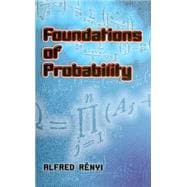
Note: Supplemental materials are not guaranteed with Rental or Used book purchases.
Purchase Benefits
What is included with this book?
Alfred Renyi: The Happy Mathematician
Alfred Renyi (1921–1970) was one of the giants of twentieth-century mathematics who, during his relatively short life, made major contributions to combinatorics, graph theory, number theory, and other fields.
Reviewing Probability Theory and Foundations of Probability simultaneously for the Bulletin of the American Mathematical Society in 1973, Alberto R. Galmarino wrote:
"Both books complement each other well and have, as said before, little overlap. They represent nearly opposite approaches to the question of how the theory should be presented to beginners. Rényi excels in both approaches. Probability Theory is an imposing textbook. Foundations is a masterpiece."
In the Author's Own Words:
"If I feel unhappy, I do mathematics to become happy. If I am happy, I do mathematics to keep happy."
"Can the difficulty of an exam be measured by how many bits of information a student would need to pass it? This may not be so absurd in the encyclopedic subjects but in mathematics it doesn't make any sense since things follow from each other and, in principle, whoever knows the bases knows everything. All of the results of a mathematical theorem are in the axioms of mathematics in embryonic form, aren't they?" — Alfred Rényi
| Experiments | |
| The definition of an experiment | p. 1 |
| Algebras of events as Boolean algebras | p. 6 |
| Operations with experiments | p. 9 |
| Canonical representation of polynomials of events | p. 12 |
| Qualitative independence | p. 16 |
| On the structure of algebras of events of a finite or denumerable basic space | p. 17 |
| Random mappings and random variables | p. 20 |
| Qualitative entropy and information | p. 23 |
| Probability | |
| The intuitive notion of probability | p. 33 |
| Conditional probability spaces | p. 38 |
| Probability spaces | p. 47 |
| Some remarks on the history of probability theory | p. 53 |
| Limits of conditional probability spaces | p. 57 |
| Linear inequalities and identities of probability theory | p. 63 |
| Random variables on probability spaces | p. 68 |
| Random variables on conditional probability spaces | p. 72 |
| Expectations and other characteristics of probability distributions | p. 74 |
| Conditional expectations and other characteristics of random variables | p. 81 |
| Inequalities concerning random variables | p. 85 |
| Some remarks on the notion of random variables | p. 86 |
| Independence | |
| Independence of two events | p. 100 |
| Independence of sequences of events | p. 104 |
| Construction of a probability measure with respect to which qualitatively independent events are independent | p. 109 |
| Product spaces | p. 119 |
| Independent random variables | p. 122 |
| Independence and orthogonality | p. 127 |
| Independence and ergodic theory | p. 138 |
| Independence and information | p. 146 |
| Sufficient functions | p. 157 |
| Markov chains | p. 159 |
| The Laws of Chance | |
| The nature of laws of chance | p. 174 |
| Types of convergence of sequences of random variables | p. 175 |
| Convergence of probability distributions | p. 180 |
| The laws of large numbers | p. 195 |
| Approximations to the binomial and multinomial distributions | p. 204 |
| The Poisson process | p. 213 |
| The central limit theorem | p. 223 |
| Laws of fluctuation | p. 229 |
| Dependence | |
| Conditional expectations with respect to a [sigma]-algebra | p. 259 |
| Martingales | p. 268 |
| Inequalities for martingales | p. 273 |
| A martingale-convergence theorem and its applications | p. 276 |
| Existence theorems | p. 289 |
| Limit theorems for Markov chains | p. 293 |
| Stable sequences of events | p. 301 |
| Mixing sequences of events | p. 308 |
| Exchangeable events | p. 315 |
| The invariance of limit theorems under change of measure | p. 322 |
| Appendix A | p. 345 |
| Appendix B | p. 354 |
| Index | p. 360 |
| Table of Contents provided by Ingram. All Rights Reserved. |
The New copy of this book will include any supplemental materials advertised. Please check the title of the book to determine if it should include any access cards, study guides, lab manuals, CDs, etc.
The Used, Rental and eBook copies of this book are not guaranteed to include any supplemental materials. Typically, only the book itself is included. This is true even if the title states it includes any access cards, study guides, lab manuals, CDs, etc.